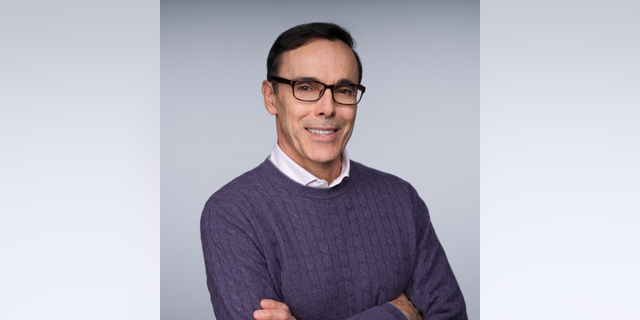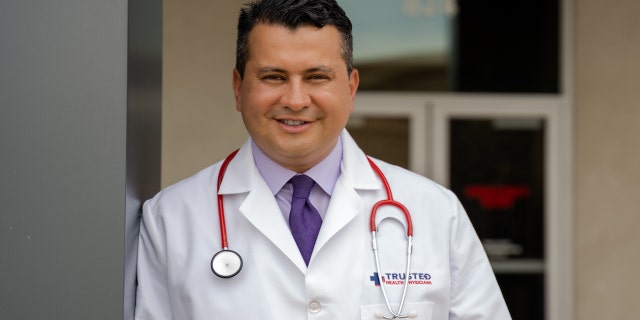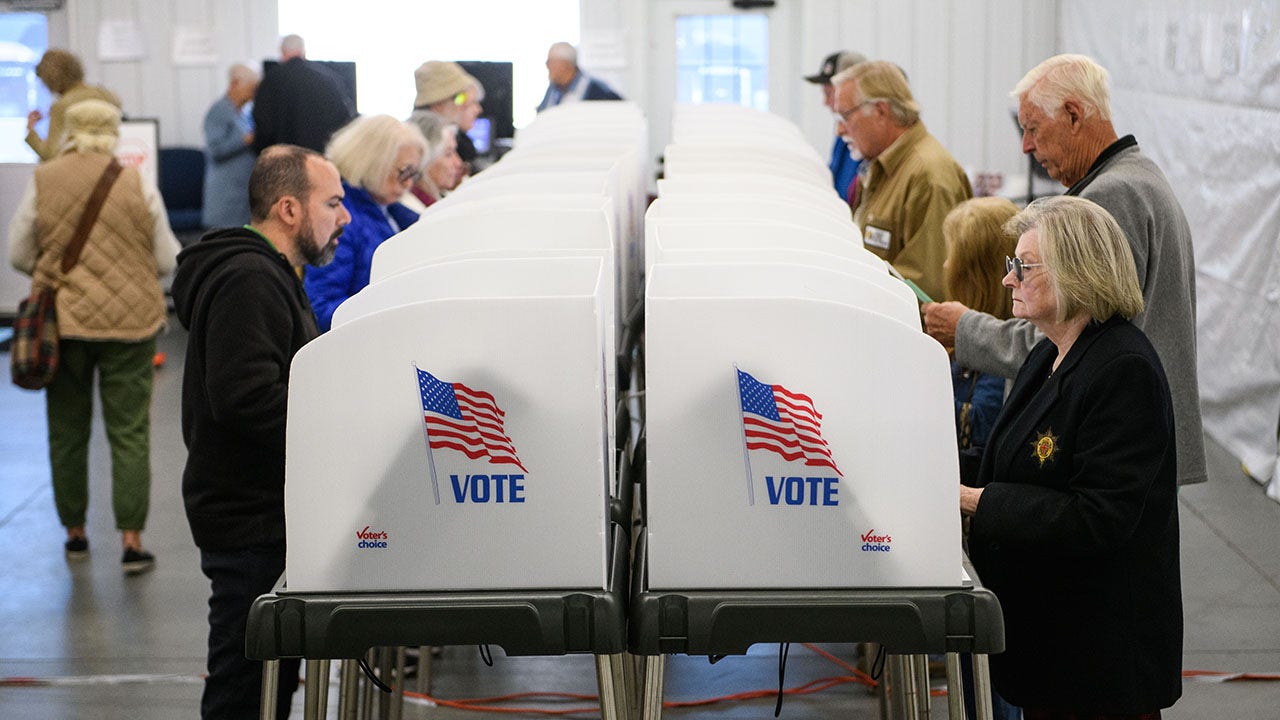Health
As AI shows up in doctors’ offices, most patients are giving permission as experts advise caution

Artificial intelligence has been used “behind the scenes” in health care for decades, but with the growing popularity of new technologies such as ChatGPT, it’s now playing a bigger role in patient care — including during routine doctor’s visits.
Physicians may rely on AI to record conversations, manage documentation and create personalized treatment plans. And that raises the question of whether they must get patients’ permission first to use the technology during appointments.
“While regulations may vary by jurisdiction, obtaining informed consent for using AI is often considered best practice and aligns with the principles of medical ethics,” Dr. Harvey Castro, a Dallas, Texas-based board-certified emergency medicine physician and national speaker on artificial intelligence in health care, told Fox News Digital.
WHAT IS ARTIFICIAL INTELLIGENCE (AI)?
“It ensures transparency and respects patient autonomy,” he added.
“Regulatory bodies and health care institutions may provide specific guidelines.”
As more physicians rely on AI to record conversations, manage documentation and create personalized treatment plans, should they get patients’ permission to do so? The debate is under way. (Augmedix)
Augmedix, a medical technology company in San Francisco, offers solutions that allow doctors to capture documentation using ambient AI technology.
“We repurpose the conversation that occurs between a doctor and a patient, and use that as the basis for creating a medical note, which is required for every patient visit,” CEO Manny Krakaris said in an interview with Fox News Digital.
Manual documentation by physicians, on the other hand, can consume up to a third of their day, Krakaris said.
NEW AI ‘CANCER CHATBOT’ PROVIDES PATIENTS AND FAMILIES WITH 24/7 SUPPORT: ‘EMPATHETIC APPROACH’
“That’s a lot of wasted time spent on administrative tasks, which could be applied to spending more time with their patients and interacting with them on a very human level,” Krakaris said.
The AI technology can also help reduce physician burnout, Krakaris noted, as it can allow doctors to reduce their workload and spend more time with their families.

Manny Krakaris is CEO of Augmedix, a San Francisco medical technology company that offers solutions for doctors to create documentation using ambient AI technology. He said AI tech can help reduce physician burnout. (Manny Krakaris/Augmedix)
Based on surveys from Augmedix’s clients, patients generally feel a greater sense of satisfaction when the doctor pays full attention and listens to them during the visit, rather than being distracted or diverted by a computer screen.
In terms of HIPAA compliance with AI-generated documentation, things can get a little murky.
“Artificial intelligence wasn’t even a term when HIPAA was created, so it has some catching up to do.”
“HIPAA does not specifically require patient consent for the use of AI — artificial intelligence wasn’t even a term when HIPAA was created, so it has some catching up to do,” Krakaris said.
AI-generated documentation is permissible under HIPAA, he said, “as long as the intent is to use it to contribute to generalized knowledge — and that’s typically how this is used.”
NEW AI TOOL HELPS DOCTORS STREAMLINE DOCUMENTATION AND FOCUS ON PATIENTS
There are also individual state laws that govern patient privacy, Krakaris noted, and physicians must adhere to those whether they’re using AI or not.
Among Augmedix’s clients, Krakaris said that obtaining AI consent is generally part of the patient intake process.
“It will vary from one enterprise to another in terms of how that is done,” he said.

When physicians do their own documentation manually, it can consume up to a third of their day, Krakaris pointed out. (iStock)
Some practices require only verbal consent to use ambient technology to help generate the medical note, while others require written consent.
Overall, most patients are open to the use of AI in the doctor’s office, with the typical opt-in rate across all of Augmedix’s customers averaging about 99%, the company said.
“So there hasn’t been any kind of widespread hesitation on the part of patients to use AI or to take advantage of this technology,” said Krakaris, sharing his experiences.
WHAT ARE HIPAA RIGHTS?
Some patients, however, may have concerns about privacy, data security or the impersonal nature of AI, Castro pointed out.
“Ethical considerations, mistrust of technology or cultural beliefs may also deter consent,” he told Fox News Digital.
“It’s essential to address these concerns with empathy and integrity, and I always ensure that patients understand that I do not violate HIPAA laws,” he added.

Dr. Harvey Castro is a board-certified emergency medicine physician and national speaker on artificial intelligence in health care in Dallas, Texas. He said people of different ages often respond to technology differently — and stressed the need for “patient-centered care.” (Dr. Harvey Castro)
People in different age groups often respond to technology differently, Castro said.
“Education is vital to addressing concerns about AI,” he said. “It’s realistic and ethically responsible for physicians or health care staff to provide clear explanations and education about AI’s role in care.”
“This fosters trust and empowers patients to make informed decisions.”
NEW AI TECH AIMS TO DETECT THE ORIGIN OF CANCERS FOR OPTIMAL TREATMENTS: ‘AN IMPORTANT STEP’
In Krakaris’ view, physicians are the best source for explaining the use of the particular technology, because it happens during the encounter with patients.
“That’s the perfect time to do it — at the point of care,” he said.
“Emphasizing transparency, informed consent and education ensure that AI can enhance, not replace, the human touch in medicine.”
Each of Augmedix’s clients also gets a one-page laminated description that fully explains what the AI does and how patient data is protected.
“After they have a chance to review that, they’re asked whether they opt in or not,” Krakaris said.
There are risks associated with “blindly relying” on using large language models to summarize the doctor-patient experience, Krakaris said — especially given the current shortage of health care providers.

Based on surveys from Augmedix’s clients, patients generally feel a greater sense of satisfaction when the doctor pays full attention and listens to them during the visit. (iStock)
“The large language models are prone to errors — it’s been widely documented,” he said.
“And so you need to provide guardrails to ensure that those errors are removed from the final medical note,” he also said.
In Krakaris’ view, that guardrail is human judgment.
CLICK HERE TO SIGN UP FOR OUR HEALTH NEWSLETTER
“A human expert needs to apply their expertise to that final product,” he said. “The technology isn’t nearly good enough today to be able to do that.”
As the integration of AI in health care continues, Castro stressed the need for a commitment to “ethics, integrity and patient-centered care.”
“Emphasizing transparency, informed consent and education will ensure that AI can enhance, not replace, the human touch in medicine.”

Health
Here Are the Nearly 2,500 Medical Research Grants Canceled or Delayed by Trump

In his first months in office, President Trump has slashed funding for medical research, threatening a longstanding alliance between the federal government and universities that helped make the United States the world leader in medical science.
Some changes have been starkly visible, but the country’s medical grant-making machinery has also radically transformed outside the public eye, a New York Times analysis found. To understand the cuts, The Times trawled through detailed grant data from the National Institutes of Health, interviewed dozens of affected researchers and spoke to agency insiders who said that their government jobs have become unrecognizable.
In all, the N.I.H., the world’s premier public funder of medical research, has ended 1,389 awards and delayed sending funding to more than 1,000 additional projects, The Times found. From the day Mr. Trump was inaugurated through April, the agency awarded $1.6 billion less compared with the same period last year, a reduction of one-fifth. (N.I.H. records for May are not yet comparable.)
The impacts extend far beyond studies on politically disfavored topics and Ivy League universities like Columbia or Harvard. The disruptions are affecting research on Alzheimer’s, cancer and substance use, to name just a few, and studies at public institutions across the country, including in red states that backed Mr. Trump.
Use dropdown or start typing to search institutions
“I think people should know that research that they probably would support is being canceled,” said Eden Tanner, a chemist at the University of Mississippi, who had been working with a colleague at Ohio State University to develop a novel approach for treating glioblastoma, an aggressive form of brain cancer. Their grant had been awarded through a program designed to diversify the biomedical workforce; in April, they were notified that it was being terminated.
“I would like to cure brain cancer,” Dr. Tanner said. “I think that’s not particularly controversial.”
Mr. Trump’s campaign against medical research has been carried out without congressional approval, and the legality is unclear. Lawsuits have challenged the slashing or delaying of funding.
Federal officials, who have accused the N.I.H. of wasteful spending, have attributed the cuts to changing scientific priorities.
The N.I.H. “regularly examines its research portfolio” to determine which projects are “the most meritorious,” Andrew Nixon, a spokesman for the U.S. Department of Health and Human Services, said in an email. “Regular reviews of ongoing activities will help us determine the most strategic balance of projects to support and the best way to manage them going forward, especially as we need to be responsive to the often-changing nature of biomedical scientific progress.”
Scientists fear that the sweeping cuts could do long-term damage to U.S. scientific research, which has long driven medical and financial progress for the nation. “The country is going to be mourning the loss of this enterprise for decades,” said Dr. Harold Varmus, a Nobel Prize-winning cancer biologist who served as the director of the N.I.H. during the Clinton administration and the director of the National Cancer Institute under President Barack Obama.
Publicly announced cancellations
The federal government has announced the termination of 1,389 awards, with more than $820 million in recent funding.
N.I.H. grants, awarded in a competitive process, are typically paid out in installments. A researcher with a $1 million four-year grant, for instance, will get about $250,000 a year. Scientists can use this money to buy equipment and supplies and to pay the salaries of the researchers who work in their labs, among other things.
From 2015 to 2024, there have been fewer than 20 terminations a year, on average, according to Jeremy M. Berg, former director of the National Institute of General Medical Sciences at the N.I.H. from 2003 to 2011. They were generally for extenuating circumstances, such as illness or research misconduct.
But since late February, the government has publicly announced the cancellation of 1,389 N.I.H. awards. The agency scoured grants for key words and phrases like “transgender,” “misinformation,” “vaccine hesitancy” and “equity,” ending those focused on certain topics or populations, according to a current N.I.H. program officer, who asked not to be identified for fear of retribution.
Studies focused on sexual and gender minority groups were among the first on the chopping block.
Katherine Bogen, a doctoral student at the University of Nebraska-Lincoln, had been studying post-traumatic stress, alcohol use and intimate partner violence against bisexual women. The termination notice she received assailed studies “based primarily on artificial and nonscientific categories,” calling such research “antithetical to the scientific inquiry” and alleging that it was “often used to support unlawful discrimination on the basis of race and other protected characteristics, which harms the health of Americans.”
The language was “very insulting,” she said. “I get this letter that tells me, ‘Your research is not science. Not only is it ascientific, it’s a useless drain on resources, and, in fact, your research could be used to discriminate against ‘actual’ Americans or ‘regular’ Americans,’ or whatever they mean.”
The cuts spread to grants on health equity and racial and ethnic groups. Affected projects sought to improve access to mental health care for Latino, low-income and rural communities; to reduce maternal mortality among Black women; and to prevent gun violence in Asian American communities.
Tsu-Yin Wu, a researcher at Eastern Michigan University who led the gun violence project, said that community leaders and study participants were “greatly disappointed” by the grant cancellation. “Some felt betrayed that their voices and engagement no longer matter.”
The agency cut grants for research on vaccine hesitancy, disinformation and misinformation, including a Northeastern University study on cancer misinformation on social media.
It also axed research on Covid-19, including studies that could have helped the nation respond to many infectious disease threats. Among them: a grant to Emory University and Georgia State University, where researchers had developed three potential drugs that showed promise against many RNA-based viruses, including coronaviruses, Ebola, avian influenza and measles, said George Painter, a pharmacologist at Emory who was co-leading the research.
In April, the agency terminated, in part or in whole, more than 350 grants meant to support students, early-career scientists or researchers from groups underrepresented in science. Among these terminations were F31 diversity grants, awarded to Ph.D. students who were members of certain racial or ethnic groups, disabled or from disadvantaged backgrounds.
At the University of Pittsburgh, Luzmariel Medina-Sanchez, who was born and raised in Puerto Rico, and Sierra Wilson, a first-generation college student from Utah, both had their grants canceled. “It’s not even about the work I’m doing,” said Ms. Wilson, who studies how liver cells respond to drug overdoses. “It feels like it’s about me.”
Ms. Medina-Sanchez, who studies how a microbe can help treat celiac disease, said she may leave science altogether. “I feel racially targeted,” she said. “I feel like I’m not going to be a professional in the field of science in America, because obviously my name is Luzmariel.”
(Ms. Wilson and Ms. Medina-Sanchez stressed that they spoke only for themselves and not for the university.)
Delayed funding
In addition to publicly announced cancellations, these are the nearly 1,100 grants that have been delayed, with nearly $740 million in funding.
Besides outright canceling projects, N.I.H. failed to distribute annual payments to more than 1,000 grants, The Times found.
The delays have stifled research on drug discovery, blood vessel health and injury response. In some cases, scientists have cut staff, paused hiring, trimmed back supplies or delayed experiments. Health officials have not explained which projects have been held up, why or for how long.
The Times compiled a list of the delayed grants by searching N.I.H. databases as of June 2 for ones that were funded in 2024 and expected to last beyond 2025, but have not gotten disbursements on schedule.
In the past, annual renewals were routine. Scientists submitted progress reports; the N.I.H. reviewed them and usually continued funding them, occasionally with a week or two of delays. But longer delays have become much more common since Mr. Trump took office.
Joshua Kritzer, a professor of chemistry at Tufts University, investigates the basic science behind potential drug candidates, laying the groundwork for future medications. Most of his lab work is supported by a five-year N.I.H. grant that received $1.4 million over the past two years. But since February, he had been waiting for the third year of expected funding to come in. He slashed purchases of essential supplies and contemplated laying off crucial researchers on his team.
On Tuesday, Kritzer finally received word that his funding had been released, several days after The Times asked federal officials about his and other delayed awards.
“Every week that’s delayed, it’s easily probably three to four weeks to get that research back to where it was,” said Dr. Kritzer, who noted that he was speaking for himself and not for his institution.
Mr. Nixon, the Department of Health spokesman, said that the agency would not discuss deliberations about specific awards but encouraged grant recipients to “speak with the designated N.I.H. officials on their award notice when questions arise.”
In some cases, delays have lasted so long that scientists wondered whether their grants were subject to a “shadow termination.”
The delays stem in part from additional screening for whether the grants align with Trump administration priorities, N.I.H. officials said. Other renewals have been delayed as overstretched N.I.H. staff members work through backlogs in funding. And political appointees are now vetting some projects, too, slowing the process further.
N.I.H. officials said they feared being fired if they processed a grant renewal that the administration disfavored.
In early May, Jon Lorsch, a longtime N.I.H. institute director who was recently promoted to acting deputy director of the agency’s external funding arm, emailed staff members denouncing the renewal of grants “that focused on topics that are not supported under N.I.H./H.H.S.’s priorities,” according to a copy of the email seen by The Times.
“The consequences of approving an award that should not have been approved could be very serious,” he wrote.
But Courtney Griffin, who leads a lab at the Oklahoma Medical Research Foundation and studies blood vessel development and disease, including complications due to diabetes, expressed confusion as to why her expected funding is not coming through. She and her colleagues were making contingency plans and looking for other sources of funding.
“It’s, ironically, a really inefficient use of people’s time to be in this guessing game,” she said, adding that the time could be better spent on biomedical research.
Months-long delays are also affecting new grants that were being vetted when the Trump administration cracked down on grant reviews.
A number of major Alzheimer’s Disease Research Centers, some of which have operated for decades, have waited months for the Trump administration to decide whether to award them fresh five-year grants. The funding gaps have set back ongoing studies and curtailed efforts to take images of patients’ brains, though the N.I.H. has recently told some centers that they would soon receive funding.
“These centers have become a safety valve for people who can’t get a neurology appointment at a private center,” said Dr. Ann Cohen, a co-director of the University of Pittsburgh Alzheimer’s center. Now, she said, things have changed. “There are fewer clinic appointments, fewer opportunities for these individuals to get brain imaging.”
The N.I.H. has also said that it will no longer fund projects in which U.S. researchers distribute some of their money to international partners, throwing the future of many global health projects into question and creating funding delays for ongoing research.
Beyond the disruption of individual projects, other proposed changes could undermine scientific research across the board, experts said. One would sharply curb funding for indirect research costs, such as building maintenance and administrative staff. And then there is Mr. Trump’s proposal to slash the N.I.H.’s total budget by about $18 billion, a cut of almost 40 percent.
A budget cut of that scale would be “truly draconian,” said Dr. Varmus, the former N.I.H. director, who said he hoped Congress would not approve such a sharp reduction. It could leave the agency without enough money to fund promising new work, drive some scientists overseas and prompt some up-and-coming researchers to leave science altogether, he said. “You can completely destroy the system in just a couple of years,” Dr. Varmus said.
Methodology
The Times’s analysis of cancellations is based on the list of terminated grant awards published by the Department of Health and Human Services as of May 30, 2025, and on records from RePORT, the National Institutes of Health’s registry of grants and projects, as of June 2, 2025.
Each circle in the graphics represents a grant award. The circles are sized by the total funding that N.I.H. authorized for each award. H.H.S.’s list of terminations includes a mix of main grant awards, supplements and amendments. The list also indicates a “total amount obligated,” but that figure generally is the total amount awarded to a grant over its lifetime, including any supplements and amendments, rather than the amount for the specific award terminated. The Times’s analysis above uses only the amount authorized for the specific award listed. In some cases, scientists had already spent much of the money they had been awarded before their grants were cancelled, but in others, they lost out on their entire awards. Award amounts and totals — including the year-to-year funding shortfall calculated by The Times — do not include N.I.H. grants administered by the U.S. Department of Veterans Affairs, because their funding amounts are not available in RePORT.
The Times examined cancellations of grants intended to train and support research by groups underrepresented in science. These include the R25 education program; the T32 and T34 training programs; F31 diversity grants; R01 research grants under funding opportunity number PAR-22-241 and research supplements under funding opportunity number PA-23-189, both of which are specifically intended to promote diversity among grant recipients.
To identify grants with delayed funding, Times journalists used information about each grant’s planned duration and prior awards, focusing on those that were eligible for continuation or noncompeting renewal. To account for reporting lags in the RePORTER database, The Times limited this analysis to a time period from Jan. 20 to April 30. The Times excluded grants that appear on H.H.S.’s public list of terminations and grants that have been marked in RePORTER as terminated. Based on interviews and an analysis of historical renewal data, The Times found such grants typically receive a notice of award at roughly the same time each year. Each circle representing a delayed grant is sized by the amount its main award received in fiscal year 2024. This list may include a small number of grants whose renewals are not yet recorded in N.I.H. databases, and others whose renewals are expected to be delayed, because of conversion of grant status for an investigator changing roles or institutions.
To classify each grant’s area of research, The Times extracted the title, the public health relevance statement and the abstract from the N.I.H.’s RePORTER database and ExPORTER files. These fields were used as input for a series of automated prompts to a large language model.
The model generated a brief description of the grant’s research objective. The model also determined if grants were related to research in areas like chronic diseases, vaccines, pandemic preparedness, misinformation, sexual and gender identity, health disparities and certain ethnic and racial groups, and diversity, equity and inclusion initiatives, and then assigned categories.
Times journalists read the projects’ public health relevance statements and abstracts, and they checked the assigned categories for accuracy. They also checked hundreds of grant descriptions and edited them for accuracy and clarity. Only the project descriptions that have been edited by Times journalists are displayed in the article.
Health
Carbohydrates and fiber linked to healthier aging in some groups, study finds

NEWYou can now listen to Fox News articles!
Carbohydrates may have gotten a bad rap, but a new study from Tufts University finds that some are better than others — and that older women in particular could reap the benefits.
The research, which was recently published in the journal JAMA Network Open, found that daily consumption of fiber and “high-quality” carbs in midlife can contribute to healthier aging and overall better wellness among older females.
The researchers defined “healthy aging” as “the absence of 11 major chronic diseases, lack of cognitive and physical function impairments, and having good mental health.”
EXPERTS REVEAL HIDDEN WAYS SUGAR ACCELERATES AGING BEYOND JUST WEIGHT GAIN
The study was led by researchers from the Jean Mayer USDA Human Nutrition Research Center on Aging (HNRCA) at Tufts University and Harvard T.H. Chan School of Public Health.
“The main takeaway of the study is that consuming dietary fiber and high-quality carbohydrates — those from fruits, vegetables, whole grains and legumes — is associated with positive health status in older adulthood,” lead author Andres Ardisson Korat, a scientist at HNRCA, told Fox News Digital.
Daily consumption of fiber and high-quality carbs in midlife can contribute to healthier aging and overall better wellness among older females. (iStock)
“This includes the absence of chronic diseases and good physical and cognitive function.”
The researchers collected data from the Nurses’ Health Study, in which 47,000 women reported their dietary habits and health outcomes between 1984 and 2016, according to a Tufts press release.
The women ranged in age from 70 to 93 by the end of the study period.
EATING THIS BREAKFAST FOOD COULD HELP YOU LIVE LONGER, STUDY SUGGESTS
The researchers looked at the women’s consumption of dietary fiber, total carbohydrates, refined carbohydrates, high-quality (unrefined) carbohydrates, and carbohydrates from whole grains, fruits, vegetables and legumes.
They also analyzed glycemic index (each food’s score indicating how much it raises blood sugar) and glycemic load, which also takes into account portion size to provide a more accurate measure of each food’s impact on blood sugar.
“It’s not just about ‘carbs versus fats versus protein’ — it’s about what kind of carbs you’re eating.”
Women who consumed higher amounts of total carbohydrates; high-quality carbohydrates from whole grains, fruits, vegetables and legumes; and total dietary fiber in midlife were 6% to 37% more likely to have healthy aging and to score higher in several areas of mental and physical wellness, the study found.
Conversely, consuming refined carbohydrates — which come from added sugars, refined grains and potatoes — and starchy vegetables resulted in a 13% reduced chance of healthy aging.
Quality over quantity
“This study reinforces something many of us intuitively feel: quality matters,” noted Melanie Avalon, a health influencer, entrepreneur and biohacker based in Atlanta, Georgia.
“It’s not just about ‘carbs versus fats versus protein’ — it’s about the kind of carbs you’re eating.”

The researchers looked at the women’s consumption of dietary fiber, total carbohydrates, refined carbohydrates, high-quality (unrefined) carbohydrates, and carbohydrates from whole grains, fruits, vegetables and legumes. (iStock)
Avalon, who was not involved in the research, discussed some of the more notable findings with Fox News Digital.
“Perhaps most surprising was the finding that replacing just 5% of calories from carbohydrates with protein (from either plant or animal sources) was associated with lower odds of healthy aging by 7% to 37%,” she said.
HEALTHY EATING IN MIDDLE AGE HAS THIS KEY LONGEVITY BENEFIT
Avalon also noted that when carbohydrates were segmented by type — processed versus unprocessed — the associations with healthy aging were independent of BMI (body mass index), a metric typically closely linked to metabolic health.
“This suggests the effects of carbohydrate quality on healthy aging were not solely explained by weight-loss effects,” she said.

Based on the study findings, experts recommend focusing on whole, unprocessed foods, including fruits, vegetables, legumes and whole grains. (iStock)
The study also briefly touched on the controversial topic of seed oils.
“It found that higher intake of polyunsaturated fatty acids (PUFAs) — which are commonly found in seed oils — was linked to decreased odds of healthy aging, adding nuance to the ongoing debate,” Avalon added.
Based on the study findings, the biohacker recommends favoring whole, unprocessed foods, including fruits, vegetables, legumes and whole grains.
“Shop the perimeter of the grocery store for produce and whole grains, as well as the freezer aisles for frozen fruit and vegetables,” she suggested. “Consider dipping into the aisles only for pantry staples like canned legumes.”
For those who tolerate grains, people can reap the benefits of foods like quinoa, brown rice, oats and whole wheat products, Avalon noted.

“Prioritize fiber-rich foods and minimize refined carbohydrates like white bread, sugary beverages and ultraprocessed snacks,” an expert advised. (iStock)
“Prioritize fiber-rich foods and minimize refined carbohydrates like white bread, sugary beverages and ultraprocessed snacks.”
“These shifts can meaningfully support healthy aging and reduce the risk of chronic disease.”
Limitations and future research
One chief limitation of the study is that the participants were mainly white female healthcare workers.
“Because of the observational nature of the study, we cannot rule out confounding by other variables,” Korat said. “We would have liked to have data on men to evaluate the associations in this group.”
CLICK HERE TO SIGN UP FOR OUR HEALTH NEWSLETTER
The researchers called for more diverse studies that look closer at how dietary fiber and high-quality carbs contribute to healthy aging.
“We hope our findings help inform consumers about the importance of healthy diets in the promotion of healthy aging,” Korat added.
“Personalized nutrition, grounded in both science and self-awareness, may be key to thriving across the decades.”
“The more we can understand about healthy aging, the more science can help people live healthier for longer.”
Avalon added that while diet is “foundational,” it’s just one piece of the “healthy aging puzzle.”
For more Health articles, visit www.foxnews.com/health
“Exercise, sleep, stress management and social connection all play a role,” she said.
“Ultimately, personalized nutrition, grounded in both science and self-awareness, may be key to thriving across the decades.”
Health
5 Best High-Protein Breakfasts for Weight Loss—Cottage Cheese Included!

Use left and right arrow keys to navigate between menu items.
Use escape to exit the menu.
Sign Up
Create a free account to access exclusive content, play games, solve puzzles, test your pop-culture knowledge and receive special offers.
Already have an account? Login
-

 Movie Reviews1 week ago
Movie Reviews1 week agoMOVIE REVIEW – Mission: Impossible 8 has Tom Cruise facing his final reckoning
-

 Politics1 week ago
Politics1 week agoTrump honors fallen American heroes, praises God in Memorial Day address: 'Great, great warriors'
-

 Politics1 week ago
Politics1 week agoTrump admin asking federal agencies to cancel remaining Harvard contracts
-

 Culture1 week ago
Culture1 week agoCan You Match These Canadian Novels to Their Locations?
-

 Politics1 week ago
Politics1 week agoHomeland Security chief Noem visits Netanyahu ahead of Jerusalem Day
-

 News1 week ago
News1 week agoHarvard's president speaks out against Trump. And, an analysis of DEI job losses
-

 Technology1 week ago
Technology1 week agoThe Browser Company explains why it stopped developing Arc
-

 News1 week ago
News1 week agoRead the Trump Administration Letter About Harvard Contracts















